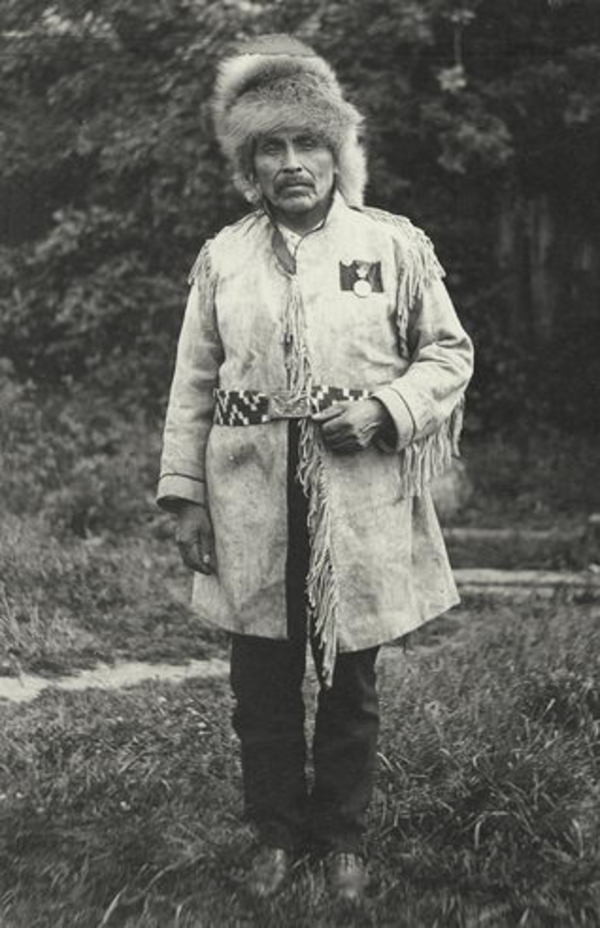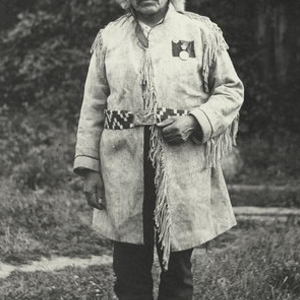
Source: Courtesy of Wikimedia Commons
SU-Á-PU-LUCK (Joseph Capilano), Squamish leader; b. c. 1854 in Yekw’ts (near Squamish, B.C.), son of Letekwámcheten; m. 21 May 1872 Mary Agnes Líxwelut, probably in Mission Indian Reserve No.1, B.C., and they had 12 children; d. 10 March 1910 in Capilano Indian Reserve, B.C.
Su-á-pu-luck was born when most Squamish still lived according to traditional ways, and his life reflected the massive changes that followed from the incursion of Europeans into Squamish land in the second half of the 19th century. Little is known of his early years, but no doubt as a boy he learned the indigenous ways of hunting and fishing and became familiar with the best places to gather resources. As a young man he may have gone alone into the forest on a spirit quest, but he also followed a new form of spirituality. Roman Catholic missionaries worked among the native people of the lower mainland through the 1860s and Su-á-pu-luck was influenced by their teaching. He was baptized on the day he married Mary Agnes Líxwelut. By this time he was living on the exclusively Catholic Mission reserve in what is now North Vancouver, and he was providing for himself and his growing family in less traditional ways, working as a labourer in lumber mills. White people around Burrard Inlet called him Háyas Joe because of his strength.
In 1895 one of the leaders of the Squamish, Chief Láwa, died and there was no clear successor to his position. It appears that Su-á-pu-luck became chief partly through the influence of the Catholic missionary Paul Durieu*. A number of Squamish who did not wish to follow missionary teaching were leaving the Mission reserve and moving to the Capilano reserve a little to the west. Durieu believed that Su-á-pu-luck would convert people at Capilano to Christianity because he was a committed Christian and an influential and persuasive orator. After he became chief and moved to Capilano he did convert a number of Squamish, and a new church was built there. Yet Christianity was not enforced as rigorously as it was at Mission, and converts lived alongside those who held exclusively to traditional beliefs.
Having established his leadership at Capilano, Su-á-pu-luck became increasingly involved in the wider issues of native rights. He began travelling to Vancouver Island and up the mainland coast to preach this cause and he worked to gain publicity through Vancouver newspapers. He objected to the fact that native people had lost much of their land and that they were increasingly constrained by new hunting and fishing regulations. Lack of redress led to the event for which Su-á-pu-luck is best known: in 1906 he led a delegation to England to meet King Edward VII. Its membership of native elders – Basil David of the Shuswap and Chillihitza of the Okanagan were the other representatives – was selected at meetings held on the coast and in the interior. In preparation for his departure Su-á-pu-luck was given a name that had been held by several generations of respected leaders among both the Squamish and the Musqueam and was therefore suitable for one who was to meet the king of England. The anglicized version is Capilano. From then on he was known to many as Joe Capilano though apparently the Squamish always called him Su-á-pu-luck.
The delegation of elders travelled to Ottawa, where they met Prime Minister Sir Wilfrid Laurier*, and then on to London. Although they had no arrangement for an audience with the king, one was organized by the Canadian high commissioner, Lord Strathcona [Donald A. Smith*]. The petition expressing their grievances was not presented directly to the monarch but had to be sent through diplomatic channels. It asserted that aboriginal title to the land had never been extinguished, that settlers had moved onto the land without its owners’ approval, that appeals to the Canadian government had been fruitless, and that native people, who lacked the vote, were not even consulted by Indian agents on matters affecting their lives. On his return home Su-á-pu-luck was received with great enthusiasm by his people but he had to admit that, apart from generating some much-needed publicity for his cause, the trip had achieved nothing concrete. While the meeting with the king was a pleasant occasion, the real problems of native people in British Columbia would have to be dealt with by Canadian governments. The trip to Britain was, however, an important step for native people in the process of taking political protest into their own hands. Perhaps because the priests had not supported his venture, Su-á-pu-luck rejected the Roman Catholic Church soon after his return and told them that they would not longer be welcome in his community.
For the rest of his life Su-á-pu-luck continued to press for the recognition of native rights. In 1908 he made another unrewarding trip to Ottawa and travelled to the Skeena River to urge native people there to assert their claims. Inevitably, however, nonnative people began to see him as a troublemaker. He was described as a “nuisance” in Vancouver newspapers, and in the north there were calls from government officials for his arrest and prosecution. Among his own people he remained a leader of dignity and power. When he died on 10 March 1910, his funeral on the Capilano reserve was attended by native leaders from the lower mainland and Vancouver Island who all spoke of his pre-eminence.
Many of the tales in Emily Pauline Johnson*’s Legends of Vancouver (Vancouver, 1911) are based on stories that Su-á-pu-luck told her.
BCARS, GR 429, box 15, file 5, F. S. Hussey to W. J. Bowser, 3 Nov. 1908. British Columbia Indian Language Project (Victoria), Account of Su-á-pu-luck prepared by Louis Miranda, August 1983. Vancouver Daily Province, 5 June 1908. J. W. Morton, Capilano: the story of a river (Toronto and Montreal, 1970). E. P. Patterson, The Canadian Indian: a history since 1500 (Don Mills [Toronto], 1972), 169.
Cite This Article
Robin Fisher, “SU-Á-PU-LUCK (Joseph Capilano),” in Dictionary of Canadian Biography, vol. 13, University of Toronto/Université Laval, 2003–, accessed December 31, 2025, https://www.biographi.ca/en/bio/su_a_pu_luck_13E.html.
The citation above shows the format for footnotes and endnotes according to the Chicago manual of style (16th edition). Information to be used in other citation formats:
| Permalink: | https://www.biographi.ca/en/bio/su_a_pu_luck_13E.html |
| Author of Article: | Robin Fisher |
| Title of Article: | SU-Á-PU-LUCK (Joseph Capilano) |
| Publication Name: | Dictionary of Canadian Biography, vol. 13 |
| Publisher: | University of Toronto/Université Laval |
| Year of publication: | 1994 |
| Year of revision: | 1994 |
| Access Date: | December 31, 2025 |



